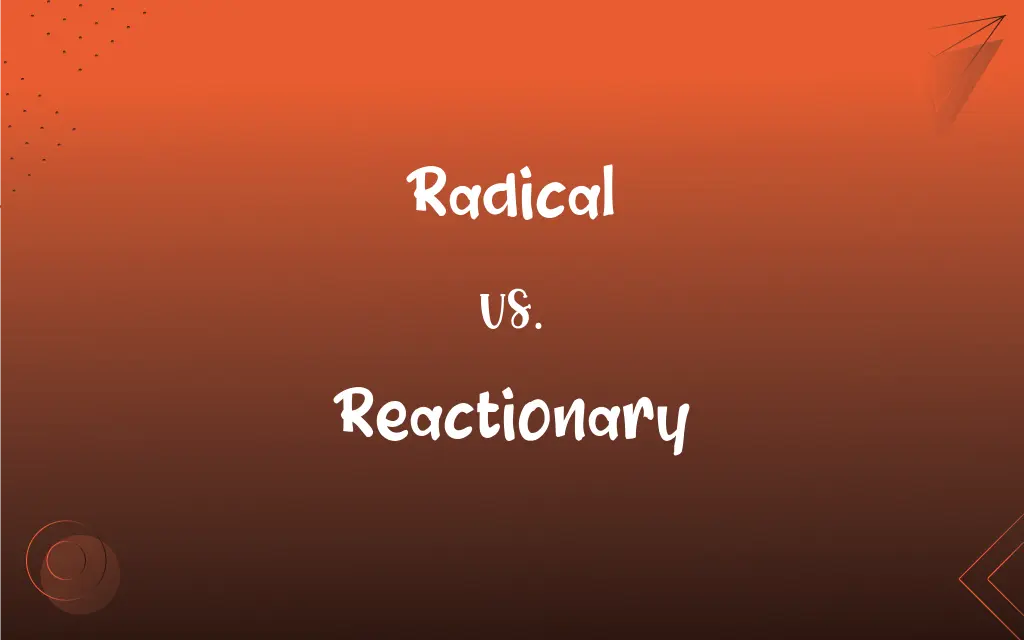Radical vs. Reactionary: What's the Difference?
Edited by Aimie Carlson || By Janet White || Updated on November 16, 2023
Radical refers to seeking or implementing significant, often fundamental, change; reactionary describes opposing change and favoring a return to previous conditions.

Key Differences
Radical refers to ideas, actions, or people advocating for substantial or foundational changes, often in a political or social context. In contrast, reactionary describes a stance or movement that resists change and seeks to revert to earlier policies or conditions.
Radicals are typically associated with progressive or revolutionary changes, aiming to overhaul existing systems or structures. Reactionaries, on the other hand, often respond to such changes by pushing for a return to traditional or previous norms.
The term radical can imply a break from traditional methods or beliefs, favoring innovative or untested approaches. Reactionary, however, implies a resistance to innovation and a preference for preserving the status quo or returning to past practices.
Radical movements or ideas often challenge the existing order and propose transformative changes. Reactionary movements, in response, defend the established order and often arise as a direct opposition to radical initiatives.
In historical context, radicals have been key drivers of social, political, and cultural changes. Reactionaries have played roles in resisting such changes, sometimes leading to conflicts or debates between progressive and conservative ideologies.
ADVERTISEMENT
Comparison Chart
Ideology
Seeking fundamental change
Opposing change, favoring past conditions
Association
Progressive, revolutionary
Conservative, traditionalist
Approach
Innovative, transformative
Preservative, restorative
Reaction
Challenge existing order
Defend established order
Historical Role
Drivers of change
Resisters of change
ADVERTISEMENT
Radical and Reactionary Definitions
Radical
Advocating significant change.
The radical proposal called for complete reform of the system.
Reactionary
Opposing political or social progress.
The reactionary policies aimed to reverse the reforms.
Radical
Extreme or thorough.
He took a radical approach to solving the problem.
Reactionary
Conservative or traditional in nature.
He was known for his reactionary views.
Radical
Fundamentally different.
Her radical ideas were a departure from tradition.
Reactionary
Resisting change or innovation.
The party's reactionary approach hindered progress.
Radical
Favoring drastic political or social reform.
The radical group demanded immediate action.
Reactionary
Defending established practices.
The group's reactionary agenda focused on preserving traditions.
Radical
Relating to the root or basis.
Their study focuses on radical changes in the climate.
Reactionary
Favoring a return to previous states.
Their reactionary stance was against modernization.
Radical
Arising from or going to a root or source; basic
Proposed a radical solution to the problem.
Reactionary
Characterized by reaction, especially opposition to progress or liberalism; extremely conservative
The principal is very reactionary.
She wants the school to stay the way it has been for the last 50 years.
Radical
Departing markedly from the usual or customary; extreme or drastic
A radical change in diet.
Reactionary
An opponent of progress or liberalism; an extreme conservative.
Reactionary
(politics) Favoring a return to an alleged golden age of the past; anti-progressive.
FAQs
Is 'reactionary' always negative?
'Reactionary' often has a negative connotation, but it depends on context.
Do reactionaries always resist change?
Generally, reactionaries oppose or resist significant changes.
Can 'radical' imply extreme views?
Yes, radical can sometimes imply extreme or far-reaching views.
Are radicals always progressive?
Radicals are often progressive, but the term can apply to various ideologies.
What does 'radical' mean in politics?
In politics, radical means advocating for substantial or foundational changes.
Can 'radical' refer to non-political changes?
Yes, radical can refer to any fundamental change, including in non-political areas.
Are reactionaries always conservative?
Reactionaries are often conservative, favoring traditional values.
Is 'reactionary' the opposite of 'progressive'?
Yes, reactionary is often considered the opposite of progressive.
Do reactionaries only focus on the past?
Reactionaries often focus on returning to or preserving past conditions.
Can a person be both radical and reactionary?
Typically, these terms represent opposing stances, so it's rare for one person to embody both.
Can businesses have reactionary policies?
Yes, businesses can adopt reactionary policies, often resisting industry changes.
Can a radical idea become mainstream?
Over time, radical ideas can become mainstream as societal views change.
Do reactionary movements resist all types of change?
Reactionary movements primarily resist changes they perceive as negative or harmful to traditional values.
Is radicalism linked to a specific political party?
Radicalism isn't exclusive to any party but is associated with major reforms.
Is 'radical' a negative term?
'Radical' can be seen negatively or positively, depending on perspective.
How are radicals viewed in history?
Radicals are often viewed as agents of change, sometimes controversially.
Can a society be both radical and reactionary?
Societies can have both radical and reactionary elements, often leading to dynamic tensions.
Are radical reforms always successful?
The success of radical reforms varies and depends on many factors, including public support and implementation.
Are radical changes always large?
Radical changes are typically significant, but their scale can vary.
Do reactionaries oppose technological advancement?
Reactionaries may oppose technological advancements if they conflict with traditional values.
About Author
Written by
Janet WhiteJanet White has been an esteemed writer and blogger for Difference Wiki. Holding a Master's degree in Science and Medical Journalism from the prestigious Boston University, she has consistently demonstrated her expertise and passion for her field. When she's not immersed in her work, Janet relishes her time exercising, delving into a good book, and cherishing moments with friends and family.
Edited by
Aimie CarlsonAimie Carlson, holding a master's degree in English literature, is a fervent English language enthusiast. She lends her writing talents to Difference Wiki, a prominent website that specializes in comparisons, offering readers insightful analyses that both captivate and inform.































































